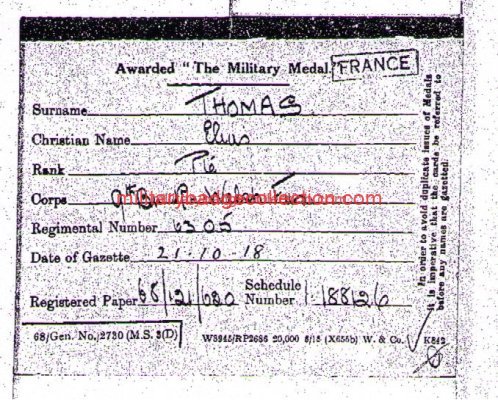333: UK Medals
UK Medals
9th (Service) Battalion, The Royal Welch Fusiliers was raised at Wrexham on the 9th of September 1914 as part of Kitchener’s Second New Army and joined 58th Brigade, 19th (Western) Division. They trained at to Tidworth, spending the winter in billets in Basingstoke, they returned to Tidworth in March 1915 for final training and proceeded to France, landing at Boulogne on the 19th of July 1915. Their first action was at Pietre, in a diversionary action supporting the Battle of Loos. In 1916 They were in action during the Battle of the Somme, capturing La Boisselle and being involved in The attacks on High Wood, The Battles of Pozieres Ridge, the Ancre Heights and the Ancre. In 1917 they were in action in The Battle of Messines and the Third Battles of Ypres. In 1918 They fought on The Somme during The Battle of St Quentin and The Battle of Bapaume and in the Battles of the Lys at Messines, Bailleul and The First Battle of Kemmel Ridge. They fought in The Battle of the Aisne and during the Final Advance in Picardly they were in action in The Battle of the Selle, The Battle of the Sambre and the passage of the Grand Honelle. At the Armitice were were in billets near Bavay. Demobilisation began in December 1918 and the final cadres returned to England on the 27th of June 1919.
WW1 Interallied Medal
The idea of an inter-allied medal to commemorate victory in what was termed ‘The Great War for Civilisation’ is credited to the French Field-Marshal Foch. It was agreed that each of the Allies should issue a medal to their nationals featuring a figure representing ‘Victory’ on the front and have a symmetric double rainbow ribbon with red, the colour of courage and sacrifice at the centre, representing the colours of the allies flags and presenting an allegory of calm after storm
Khedive’s Egyptian Star, 1889
Most of the battles in the final years of British influence in Egypt were rewarded with issues of the Egyptian Medal, but the Egyptian Khedive Tewfik Pasha showed his gratitude for British help with issues of his own bronze star for the campaigns in his kingdom. Most of the issues of the Star bore the date of the campaign for which they were awarded. The last, which covered fighting against the so-called Dervish forces of the Mahdiyyat régime in Sudan near Suakim in 1887 and on the Nile in 1889, was however issued undated, and was not matched by any corresponding British award. The medal is also unnamed, so we do not know who its recipient was. Lester Watson acquired it at some point before 1928.
